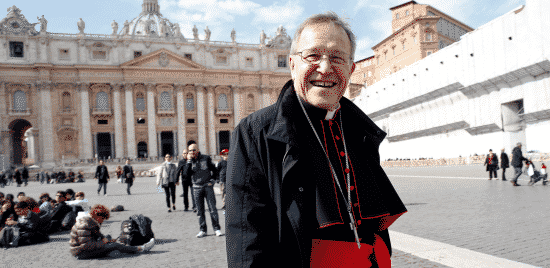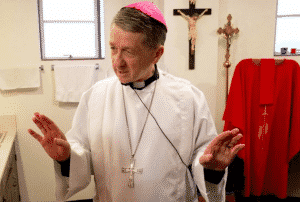Will Pope Allow Divorce and Remarriage for the Sake of Conscience?
The 2015 Roman Synod on the Family has come to a close and I’ve had a chance to review the document. As I stated back in July, the strategy of revisionist Kasperites (named after their proponent Cardinal Walter Kasper) in the Catholic Church will be to maintain official doctrine, but to change pastoral practice in the name of “mercy” so that the doctrine becomes de facto disregarded. We saw this play out during the Synod:

Thanks be to God, that the bishops at the Synod voted against the “Kasper Proposal.” If you need to catch up on what’s going down, you might read Father Z’s article on the Final Report Paragraphs 84-85. All the meat in this debate is found in those paragraphs.
[callout]UPDATED:
In 1993 Cardinal Kapser signed a pastoral letter which requested that divorced and civilly remarried German Catholics be able to receive the Eucharist under pastoral review. Then Cardinal Ratzinger and Pope Saint John Paul II strongly disapproved. So this has been in the works for over 22 years!
At Synod of Bishops in 2014, Cardinal Kasper told reporters that since African, Asian, and Middle Eastern countries have a “taboo” against homosexuality, “they should not tell us too much what we have to do.” When the quote become public, Kasper denied having made the comment. The reporter Edward Pentin later produced a recording of the conversation, which verified that the Cardinal had made such a statement.[/callout]
What is “Conscience” and How It Matters in This Debate
The “Conscience Kasperites”™ will use the slogan “conscience is inviolable” to license laymen, priests, and bishops (and popes?) to allow Catholics to openly disagree with Catholic teaching. Recently, Archbishop Blase Cupich of Chicago seems to serve as the American Apostle of “Conscience Kasperites”.

Archbishop Blase Cupich (pronounced SOO-Pitch) of Chicago (papal delegate to the Roman Synod on the Family) has said that civilly divorced and remarried Catholics should “come to a decision in good conscience” and that the Church should “help them move forward and to respect that.”
Thankfully, the Catholic Church didn’t allow King Henry VIII to “come to a decision in good conscience” and “respect that” with regard to his marriage(s). King Henry VIII, according to his own testimony, was 100% convinced that his union with Catherine of Aragon was not only null but contrary to God’s will. But the Catholic Church didn’t “help him move forward and respect that.” Schism followed but the Catholic Church stood firm for the teaching of Christ. It was the pastoral thing to do.
The Church and her bishops (and laity) don’t have magic goggles that allow them to inspect as to whether a person is living according to his or her conscience. Kasper and Cupich don’t know if a couple are living in accord with their conscience. This is why we Catholics have objective rules and tangible sacraments. Canon law and infallible magisterial teaching are the instruments of pastoral direction.
Father Z also spoke of the new doctrinal need for Catholics to get deep into the orthodox teaching on “conscience,” because the doctrine of conscience being advocated by the”Conscience Kasperites”™ is not the doctrine found in Saint John Paul II, nor in the Catechism of the Catholic Church.
Conscience is “con+scientia = “with knowledge”
Conscience is a word formed by two Latin words: con/cum (with) and scientia (knowledge). It is the judgment of reason by which we knowledgeably jude our moral actions. Here is what the Catechism says about conscience [with my comments in red]:
1796 Conscience is a judgment of reason by which the human person recognizes the moral quality of a concrete act. [conscience judges certain concrete acts – not tendencies or lifestyles]
1797 For the man who has committed evil, the verdict of his conscience remains a pledge of conversion and of hope. [conscience is a pledge toward conversion]
1798 A well-formed conscience is upright and truthful. [conscience must be well-formed] It formulates its judgments according to reason, in conformity with the true good willed by the wisdom of the Creator. Everyone must avail himself of the means to form his conscience.
1799 Faced with a moral choice, conscience can make either a right judgment in accordance with reason and the divine law [this is the part of the CCC that “Conscience Kasperites”™ reject] or, on the contrary, an erroneous judgment that departs from them.
1800 A human being must always obey the certain judgment of his conscience.
1801 Conscience can remain in ignorance or make erroneous judgments. Such ignorance and errors are not always free of guilt. [“Conscience Kasperites”™ also dismiss this truth that having a bad conscience does NOT necessarily remove moral guilt]
1802 The Word of God is a light for our path [the Word of God, the Bible is our path – so a pastor or bishop should read the word of God to us in each of these moral dilemmas so that we can make a right and true judgment]. We must assimilate it in faith and prayer and put it into practice. This is how moral conscience is formed.
What’s the take home here? A conscience is well formed “with knowledge” based on the Word of God, prayer, and truth faith.
It is literally impossible for a Catholic to read the appropriate passages in Scripture and the Catechism of the Catholic Church and conclude in their conscience:
- committing a homosexual act today is morally good.
- today I can vote to fund abortion with tax-payer funds and not be guilty of grave sin.
- if I’m still in a sacramental marriage “till death do us part,” I can have sex tonight with someone besides my living spouse.
- to masturbate at this moment is morally permissible.
- I can exploit my workers and not pay them because my conscience doesn’t bother me. It must not be a sin.
- I am aware that the Catholic Church calls contraception an “intrinsic evil,” but my conscience tells me it’s a good thing for my marriage and well-being.
Please hold fast to the authentic Catholic teaching of Saint John Paul II. The conscience is “man’s most secret core, and his sanctuary.” Yet sanctuaries must be designed, decorated, and maintained.
Ignorance does mitigate guilt and can exclude it altogether. But pastorally, a shepherd (bishop or pastor) should feed his flock with the truth, and work to form their consciences with knowledge.
[callout]Hard truth: If a parish is full of people with “badly formed consciences,” then what’s the proper pastoral response?
If my children grow up thinking that lying is okay or stealing little pieces of candy from the pharmacy is “no big deal” – then that’s my bad as a parent. I failed them as a father if they say, “When Dad saw us stealing candy at Walmart, he simply said: ‘Follow your conscience on the matter.'” But if they steal candy and know, “My father taught me not to do this, but I’m going to do it any way,” then I did my job and that’s their guilt.
Reverend and Spiritual Fathers, do your spiritual children know right from wrong? If you’ve been Pastor for 10 years and 90% of your congregation honestly thinks contraception is morally permissible, then you’ve failed them as a spiritual father. The deserve to be taught the Catholic truth in a careful, patient, and loving way. Caritas in veritate.[/callout]
If a layman says, “Yes, Father, I understand that the Church teaches that [fill in the blank] is an intrinsic evil and/or disordered but for me in my conscience it’s good…so I’m going to keep doing it anyway, and I’ll keep coming to Holy Communion,” then that pastor should pray and work so as to correct the erroneous conscience. He cannot say “I’m glad that you’ve come to a decision in good conscience…and I want to help you move forward and I respect that.”
That’s not how father’s speak with children that they love.
What Can You Do – 3 Step Program?
Step 1: Read the section in the Catechism on Conscience in full. It will take you less than 2 minutes to read. Here it is: This is your homework (CCC 1776-1802).
Step 2: Familiarize yourself with the way that Conscience Kasperites™ are using the word “conscience” to promote relativism. Relativists say, “What’s right for me may not be right for you.” Conscience Kasperites™ also affirm this teaching but they attempt to Christianize it by appealing to malformed consciences: “What’s right for your conscience may not line up with Church teaching, and that’s okay.”
Step 3: Pray and be joyful. Don’t be stressed out over this. The theological enemies of the Catholic Church always fade away. The truth of God abides forever. They will lose this battle. Their disagreement will only create a great movement of truth against it.
[reminder]Have you met Conscience Kasperites™? Are you ready? Do you think “conscience” is being abused?[/reminder]
What to Watch Next
SHOP THE TAYLOR MARSHALL STORE
Dive Deeper

GET CONFIDENT IN YOUR FAITH
Explore the fascinating world of Catholic teachings with Dr. Marshall. Together you’ll unpack the brilliant answers the Church gives to tough questions about the Faith. The best part: you go at your own pace. Start this exciting journey today.


 >
>



